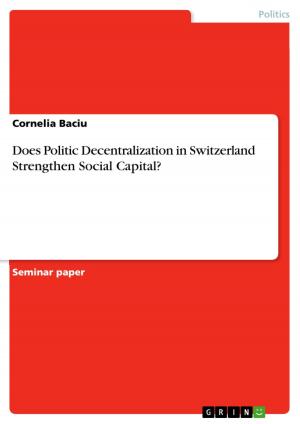The Translation of Slang
Within the Bounds of Possibility?
Nonfiction, Reference & Language, Language Arts, Linguistics| Author: | Robert Stolt | ISBN: | 9783640631971 |
| Publisher: | GRIN Publishing | Publication: | May 27, 2010 |
| Imprint: | GRIN Publishing | Language: | English |
| Author: | Robert Stolt |
| ISBN: | 9783640631971 |
| Publisher: | GRIN Publishing |
| Publication: | May 27, 2010 |
| Imprint: | GRIN Publishing |
| Language: | English |
Essay from the year 2010 in the subject Speech Science / Linguistics, grade: 1,0, University of St Andrews, language: English, abstract: 'Slang is a language that rolls up its sleeves, spits on its hands and goes to work.' This is how American poet Sandburg described the linguistic phenomenon of slang in the New York Times in 1959 (quoted in Crystal 2006: 117). His definition accurately expresses the spirit of slang, but somewhat exaggerates its virtue. Nevertheless, Sandburg's definition has become an often quoted phrase. His quotation already indicates the peculiarity of slang, which sparked my interest in analysing the relationship between such a complex linguistic manifestation and the compound human activity of translation. Therefore, this essay aims to explore the questions evolving around the translation of slang and gives examples by reference to the novel From Here to Eternity (1951) by US American writer James Jones (1921-1977). The novel was translated into several languages, inter alia into German by Otto Schrag (1951) and into Hungarian by Szíjgyártó László (1975). The novel's abundance in slang expressions means a great challenge for the translator and thus offers insightful material for the exploration of translation theory and practice. After a general introduction of the linguistic phenomenon of slang, including a theoretical analysis of its characteristics, functions and its linguistic features as well as a brief overview of slang in literature, chapter three shall introduce Jones's novel with the focus on its slang elements. Furthermore, the first part of chapter four is dedicated to explore the translatability of slang on the basis of Hervey and Higgins' theory of compromise and compensation by giving German and Hungarian translation examples of the novel. Moreover, subchapter 4.2 will examine the translation methods with regard to Jones's novel by focusing on the different traditions of American, German and Hungarian slang usage. Subchapter 4.3 shall continue to analyse the German and Hungarian translations of slang specifically in reference to From Here to Eternity. Throughout the essay certain linguistic items chosen from the novel will be analysed and German and Hungarian examples will be contrasted to the English original.
Essay from the year 2010 in the subject Speech Science / Linguistics, grade: 1,0, University of St Andrews, language: English, abstract: 'Slang is a language that rolls up its sleeves, spits on its hands and goes to work.' This is how American poet Sandburg described the linguistic phenomenon of slang in the New York Times in 1959 (quoted in Crystal 2006: 117). His definition accurately expresses the spirit of slang, but somewhat exaggerates its virtue. Nevertheless, Sandburg's definition has become an often quoted phrase. His quotation already indicates the peculiarity of slang, which sparked my interest in analysing the relationship between such a complex linguistic manifestation and the compound human activity of translation. Therefore, this essay aims to explore the questions evolving around the translation of slang and gives examples by reference to the novel From Here to Eternity (1951) by US American writer James Jones (1921-1977). The novel was translated into several languages, inter alia into German by Otto Schrag (1951) and into Hungarian by Szíjgyártó László (1975). The novel's abundance in slang expressions means a great challenge for the translator and thus offers insightful material for the exploration of translation theory and practice. After a general introduction of the linguistic phenomenon of slang, including a theoretical analysis of its characteristics, functions and its linguistic features as well as a brief overview of slang in literature, chapter three shall introduce Jones's novel with the focus on its slang elements. Furthermore, the first part of chapter four is dedicated to explore the translatability of slang on the basis of Hervey and Higgins' theory of compromise and compensation by giving German and Hungarian translation examples of the novel. Moreover, subchapter 4.2 will examine the translation methods with regard to Jones's novel by focusing on the different traditions of American, German and Hungarian slang usage. Subchapter 4.3 shall continue to analyse the German and Hungarian translations of slang specifically in reference to From Here to Eternity. Throughout the essay certain linguistic items chosen from the novel will be analysed and German and Hungarian examples will be contrasted to the English original.















